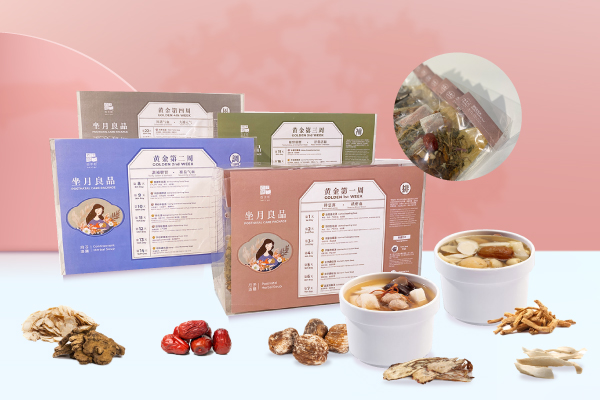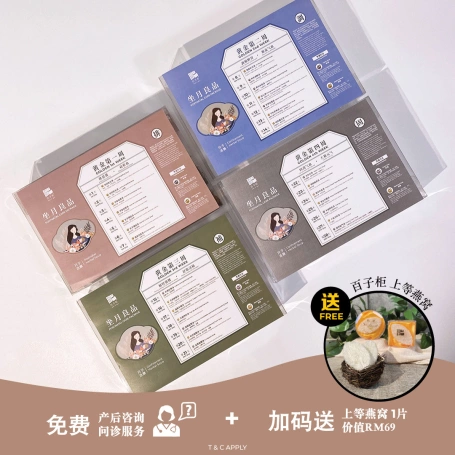Is Confinement Food Necessary for Postnatal Recovery?

Welcoming a new baby into the family is an incredibly special time, but it's also a period when new mothers need extra care and support. The postnatal period, often called the "fourth trimester," is a crucial phase for mothers as they navigate physical and emotional changes while caring for their newborns. One common practice during this time is the consumption of confinement food, a traditional dietary regimen believed to aid in postnatal recovery. In this comprehensive guide, we'll delve into the concept of confinement food, its cultural variations, nutritional benefits, common ingredients, debunk myths, and explore whether it's necessary for postnatal recovery.
Understanding Confinement Food
Confinement food, also known as postpartum diet, is a set of dietary guidelines followed by new mothers during the postnatal period. This tradition is deeply rooted in various cultures worldwide, including Chinese, Malay, Indian, and Western cultures. The primary goal of confinement food is to provide nourishment and support to new mothers as they recover from childbirth and adapt to their new roles.
Definition and Examples of Typical Confinement Foods
Confinement foods are characterized by their focus on warmth, nourishment, and ease of digestion. These foods are often prepared with ingredients believed to have healing properties and are tailored to meet the nutritional needs of postnatal mothers. Examples of typical confinement foods include:
Nourishing Soups:
Soups made with ingredients like chicken, fish, vegetables, and Chinese herbs are commonly consumed during confinement. These soups are believed to replenish vital energy and promote healing.
Herbal Tonics:
Concoctions made from a variety of Chinese herbs are brewed into tonics to boost energy levels, improve blood circulation, and aid in recovery.
Spiced Dishes:
In Malay and Indian cultures, postnatal dishes are often rich in spices and herbs like turmeric, ginger, and garlic, which are believed to have healing properties.
Nutrient-Dense Meals:
Western confinement diets emphasize nutrient-dense foods like lean meats, whole grains, fruits, and vegetables to support recovery and provide essential nutrients.
Reducing "Wind":
Many confinement foods are designed to expel "wind" from the body, a concept rooted in traditional Chinese medicine. Ingredients like ginger, sesame oil, and black vinegar are believed to have warming properties and help to dispel wind.
Cultural Variations in Confinement Food Practices
Confinement food practices vary significantly across different cultures:
Chinese Confinement Food:
Traditional Chinese confinement meals focus on warming and nourishing ingredients like ginger, sesame oil, and chicken essence. Herbal soups and tonics are also commonly consumed to replenish qi (vital energy) and promote healing.
Malay Confinement Food:
Malay confinement cuisine includes dishes rich in spices and herbs like turmeric, ginger, and galangal. Ingredients like lemongrass and coconut milk are used to add flavor and nourishment.
Indian Confinement Food:
In Indian culture, postnatal mothers consume foods rich in ghee (clarified butter), lentils, and spices like cumin and fenugreek. These foods are believed to provide strength and aid in digestion.
Western Confinement Food:
While less structured than in Asian cultures, Western traditions also include specific foods for postnatal recovery, such as broths, soups, and nutrient-rich meals to support healing and breastfeeding.
Nutritional Needs During Postnatal Recovery
New mothers have increased nutritional needs during the postpartum period, primarily to support healing, lactation, and overall well-being. Confinement foods are designed to meet these needs by providing:
Essential Nutrients:
Postnatal mothers require ample amounts of protein, iron, calcium, and vitamins to support tissue repair, replenish blood loss, and promote overall health.
Healing Ingredients:
Many confinement foods contain ingredients with healing properties, such as ginger, garlic, and Chinese herbs, which aid in recovery from childbirth and reduce inflammation.
Milk Production:
Ingredients like fenugreek, fennel, and papaya are believed to boost milk production and improve the quality of breast milk.
Digestive Health:
Confinement foods often include ingredients that aid digestion and prevent common postnatal issues like constipation and indigestion.
Benefits of Confinement Food
Confinement food offers several benefits to new mothers during the postnatal period:
Promotes Healing:
Many ingredients used in confinement foods have healing properties and can aid in recovery from childbirth, reducing postpartum swelling and promoting tissue repair.
Supports Lactation:
Certain foods are believed to enhance milk production and quality, helping new mothers meet the nutritional needs of their newborns.
Provides Energy:
Nutrient-dense ingredients like chicken, fish, and whole grains provide energy to combat fatigue and support the demands of caring for a newborn.
Enhances Mood:
Some confinement foods contain ingredients that have mood-boosting properties, helping to alleviate postnatal depression and anxiety.
Common Ingredients in Confinement Food and Their Benefits
Several ingredients commonly found in confinement foods have specific benefits for postnatal recovery:
Ginger:
Known for its anti-inflammatory properties, ginger helps reduce postpartum swelling, aids digestion, and promotes overall well-being.
Garlic:
Rich in antioxidants and antimicrobial compounds, garlic supports immune function, enhances milk production, and aids in digestion.
Chicken:
A good source of protein and iron, chicken promotes tissue repair, provides energy, and supports lactation.
Fish:
High in omega-3 fatty acids, fish supports brain health, reduces the risk of postnatal depression, and provides essential nutrients.
Red Dates:
These sweet fruits are rich in iron and vitamin C, supporting blood production, boosting energy levels, and enhancing overall health.
Debunking Myths Around Confinement Food
While confinement food has its benefits, there are also several myths associated with it that need to be addressed:
Confinement food is only for Asian cultures:
While the practice is more common in Asian cultures, variations of confinement diets exist worldwide, reflecting cultural beliefs and traditions.
Confinement food is only for mothers who have had natural births:
Confinement diets can benefit all new mothers, regardless of the mode of delivery, as they provide essential nutrients and support healing.
Confinement food is necessary for postnatal recovery:
While beneficial, confinement food is not strictly necessary for recovery; a balanced diet and adequate rest are equally important for postnatal well-being.
FAQs
Can confinement food help in reducing postnatal depression?
Certain ingredients in confinement food may have mood-enhancing properties, but postnatal depression is a complex condition that requires professional evaluation and treatment. While diet can play a role in mental health, it is not a substitute for medical intervention.
Are there any risks associated with confinement diets?
Confinement diets that are overly restrictive or unbalanced may lead to nutrient deficiencies or inadequate calorie intake. It's essential to ensure that confinement foods provide a variety of nutrients and meet the individual needs of the mother.
How long should a mother follow a confinement diet?
The duration of a confinement diet varies depending on cultural practices and individual preferences. Some mothers may follow the diet for a few weeks, while others may continue for up to three months. Ultimately, it's important to listen to your body and transition to a regular diet when you feel ready.

BZG Golden Confinement Herbal Soup – Thoughtful Care for Every Stage of Postpartum Recovery
Based on traditional Chinese medicine theory, this regimen follows a cyclical approach: Eliminate, Regulate, Nourish, and Consolidate. Specially designed for postpartum recovery, it uses hand-selected, sulfur-free herbs to ensure that new mothers can safely and effectively restore their health and vitality during the crucial 28-day golden period.
Phase One: "Eliminate"
Focus: Expelling lochia and removing stagnant blood
Postpartum, the body becomes weak, and the spleen and stomach need to be restored. The "Eliminate" soup helps new mothers effectively expel lochia, preventing it from remaining in the uterus.
Phase Two: "Regulate"
Focus: Regulating the spleen and stomach, replenishing qi and blood
Strengthening the spleen and stomach, this phase prevents the invasion of wind-cold, aiding mothers in improving blood production and building a stronger constitution.
Phase Three: "Nourish"
Focus: Strengthening the kidneys and waist, promoting circulation
Postpartum calcium loss and frequent baby carrying can cause back and waist pain. The "Nourish" soup helps replenish bone calcium and boosts immunity.
Phase Four: "Consolidate"
Focus: Protecting qi and blood, significantly boosting vitality
Modern women often experience hair loss due to stress, exacerbated by postpartum depletion. The "Consolidate" soup focuses on replenishing vital energy, aiding in the final stages of postpartum recovery.
Why Choose BZG's 28-Day Confinement Soup Package?
Easy to Prepare
No need for culinary skills. Each package is pre-portioned by day, making it easy for nannies or family members to prepare. Simply follow the instructions on the package for a nourishing and delicious confinement soup.
Comprehensive Care for Every Postpartum Stage
Suitable for natural births, C-sections, miscarriages, breastfeeding periods, and even for those who missed traditional confinement periods after childbirth.
Individually Packaged for Hygiene
Each herb is hand-selected and packaged fresh, ensuring maximum hygiene and freshness.
Sulfur-Free Herbal Selection
Many vendors use sulfur to extend the shelf life of herbs, which can burden and harm the body. BZG guarantees the use of sulfur-free herbs, allowing you to consume them with peace of mind.
In conclusion, confinement food can be a beneficial part of postnatal recovery, providing essential nutrients, promoting healing, and supporting lactation. However, it's not strictly necessary, and mothers should focus on consuming a balanced diet that meets their individual needs and preferences, along with getting plenty of rest and emotional support. Whether you choose to follow a confinement diet or not, the most important thing is to prioritize your health and well-being as you navigate the journey of motherhood.

 Bahasa melayu
Bahasa melayu 中文
中文



























